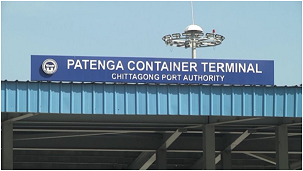
Elaborating on the benefits of the terminal, Golam Mainuddin, senior executive
director at SHR Group, which partners with the port’s first
foreign operator, said berthing for
vessels will be provided on a first-come, first-served basis, and no vessel
shall lie in wait at the outer anchorage.
However, for the first two to two and a half years,
only geared vessels – ships with cranes – will be loaded at the terminal, while
containers will be lifted with cranes available on ships.
Three gantry cranes have already been ordered, and it
will take around two years to bring them in and install them. Once the
equipment is added, this terminal will be fully operational for loading
gearless vessels, he continued.
The Patenga Container Terminal has three container
jetties and one dolphin oil jetty, allowing for the simultaneous berthing of
three container ships and one oil tanker. It is anticipated to handle 450,000
TEUs (Twenty Foot Equivalent Units) containers annually, enhancing Chattogram
Port’s ship handling and container holding capacity.
Chattogram Port, the country’s principal gateway for
seaborne trade, entered into a 22-year agreement with the Saudi Arabia-based Red Sea Gateway Terminal
International (RSGTI) on 6 December to operate the much-awaited
terminal.
According to information from Chattogram Port,
preparatory measures, including the collection and installation of equipment at
the terminal, will be taken within the first two years of the total 22 years.
Red Sea Gateway utilises the latest machinery and technology in port
management.
The port currently has three terminals – General Cargo
Berth, Chattogram Container Terminal, and New Mooring Container Terminal. The
terminals have a total of 20 jetties. Of the 19 jetties in port operations now,
six handle bulk carriers, while 13 are container ships.
The Chittagong Port Authority (CPA) began the
construction of the Patenga Container Terminal on 32 acres of land in the
Patenga area at a cost of Tk1,229 crore in 2019. The construction was completed
in June 2022. The terminal was not made operational due to a delay in operator
recruitment.
Currently,
to reach the main jetty of the port, a ship has to cross a river route of about
14 km from the estuary of the River Karnaphuli, which is just six kilometres
from the Patenga Container Terminal. The
operation and management of the port have been handled for 136 years by using
the tool port system. Consequently, the port service was plagued with
multifaceted problems, including poor port management, monopoly business, and
slow operations. In such circumstances, both the cost and time of business were
higher than at other ports worldwide. However, this time, departing from the
tool port concept, the government is
managing the port on the landlord concept, similar to developed ports
worldwide.
Mohammed Shafiqul Alam Jewel,
vice-chairman of the Bangladesh Shipping Agents’ Association, said the terminal’s launch will streamline port
operations, reduce waiting times for ships, and benefit shipping agents and
mainline operators. The increased efficiency is expected to contribute to a
positive image for Bangladesh in the global maritime sector. CPA Secretary Md
Omar Farooq said that under the supervision of the Public Private Partnership Authority
Bangladesh, Chattogram port has signed an agreement with Red Sea Gateway. The
new terminal is now ready for operation.